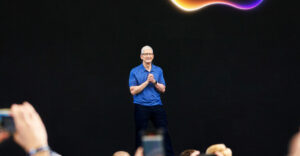
Last week,Apple became a tentative Windows platform OEM with its announcement of Boot Camp, which allows new Machardware to run Windows XP and, eventually, Vista. Apple had said it wasn’t planning to support Windows — just like it said it didn’t plan to supportIntel or bring out flash-based media players.
Take note: When Apple announces something it won’t do, it might actually be a sign or warning of something it will do. It did make last week’s column on the possibilities of Microsoft buying Apple more pertinent.
Strangely, meanwhile, Microsoft is getting pounded by the European Union to break features like its media player and anti-virus software out of Windows Vista. Setting aside the fact that there is no plan, yet, to put anti-virus software into Vista, this now seems so wrong-headed that it is looking like extortion or negligence on the part of that government entity.
Apple Tests the Idea of Windows on the Mac
If you want to talk about something that lit up the week, this was it. Suddenly, with one seemingly easy move, Apple is a player in the PC space again. Investors and the media reacted very positively to the news but the reaction from the Apple faithful is decidedly mixed.
Think of this as a big market test. With Steve Jobs now on the Disney board and very interested in getting that company to buy his products, he has undoubtedly learned that this isn’t going to happen with the Mac OS. He could get in the door, however, if his product were priced competitively and ran Windows. However, going after Disney and getting his butt whipped in the rest of the market would be both painful and stupid — and he’s neither masochistic nor dumb.
Jobs needed a big market test that he could either fund and risk a leak to the press, or productize and make money from while controlling the media message. He chose the latter, smarter, path. If sales go up dramatically, as most expect will be the case, he will have the answer to his question, which will drive him toward a more Windows-centric solution than many of the Mac folks will probably like.
Of course, given that Apple will probably have the most advanced Intel-based hardware in the market at the end of this year, it may actually have the best Windows Vista-ready hardware at that time. The impact of that is very interesting to contemplate.
Could This Result in More OS X Adoption?
So, could all of this result in more OS X adoption? The easy answer is no — and no one knows this better than Steve Jobs. When he reclaimed leadership of Apple, the company was trying to build a product that was very similar to OS/2, which had a compatibility feature that would run older applications.
He killed it because he, and all of us that covered OS/2 as analysts, had learned that what happens when you have a dual mode product like this is that developers don’t move on it. Then you are only left with your own, increasingly lonely, underused applications. This is one of the reasons Copland was killed and replaced with the hybrid Unix blend that became OS X, which had limited OS 9 support.
Developers’ decisions are generally based on revenue potential. Software has a fixed cost associated with its creation, and the revenues it generates are directly related to the number of people who will buy it. If Apple supports Windows, there is less motivation for a developer to work on the MacOS. However, Apple has been bleeding developers for years anyway, and nothing it has done so far has had any measurable impact on these losses.
Realize that OS X is a unique cost that only Apple, of all the Intel hardware OEMs, bears. This OS may do more to limit Apple’s true market opportunity — and clearly does more to reduce Apple’s margins — than any other single factor. The key word is “may,” and that is why what happens over the next few months will be critical. If this experiment is successful, Apple can change “may” to “does,” further building a foundation for decisions that take the firm toward a more Windows-centric strategy.
Apple on Windows
For those of you having heart attacks right now or thinking of creative ways to get me to retire early, realize that Apple is unlikely to do “generic” Windows. Apple knows how important its user interface is to the market and will want to hold on to that.
Fortunately for Apple — unlike when it last considered this option in the late ’90s — Windows has become increasingly modular over time. It is very likely that, just like it did for OS X, the company could eventually create a hybrid: Traditional Mac users could get a regular Mac experience if they wanted, and Windows users could be comfortable as well. Both sets of users would have access to Apple and Windows applications that they had never before been able to run.
The most exposed group, strangely enough, may actually be the Microsoft Mac Business unit. The division may suddenly look redundant. On the other hand, the Mac Business unit could have a renewed life in crafting Apple user interface elements onto existing Microsoft and third-party applications.
If done right — and nothing suggests that Jobs wouldn’t want to do it right — the result could be a product that has all the compatibility advantages of Windows Vista plus all the unique advantages of Apple products. Such a product would do some interesting things to the PC market, many would have to agree.
Historically, Apple has felt that moving to Windows would simply result in Microsoft taking the market from it. However, Apple moved to Windows with the iPod and took that market from everyone else, and Microsoft has been unable to take it back. This proves, beyond a doubt, that even on an unequal playing field, the product that is most powerfully popular among consumers will prevail.
The Declining Power of Operating System Bundles — Why the EU is Wrong-Headed
The repetitive success of well made, well marketed products against bundled offerings is something the European Union clearly doesn’t get. Perhaps the EU is simply looking for a way to tariff Microsoft without a U.S. government response. This is politics, so my money is on the tariffs — particularly since none of the proposals on the table would seem to have any impact on competition in the long run.
Back in 1995, or pre-Internet, if an application came with your PC there was only one real way to displace it, and that was to go to the store and buy something else. For example,AOL was very concerned that Microsoft was bundling MSN with Windows 95 and would quickly take AOL out as a company. There were several of us at Dataquest at the time that ran the numbers and concluded that there was no way Microsoft was going to be able to “take them out.”
We were, of course, correct, as the result was that AOL eventually was able to buy Time Warner. This wasn’t the best idea, but the outcome was clearly different from the doomsday scenario AOL had been fearing. In comparison, MSN languished during this time as a hole Microsoft poured money into — and got little out of.
In short, AOL had a better product, and even without the Internet, it was able to easily move around Microsoft’s bundle to capture vastly more market share.
Products Speak for Themselves
When it comes to music players, Microsoft was dominant before there was an iTunes in terms of deployed products. However, when it came to folks actively managing their music, Music Match, which was later acquired by Yahoo, was more widely used. When iTunes hit with the iPod, it cut through the market like a hot knife through butter, and Apple — which wasn’t even a Windows vendor before this — suddenly laid claim to the majority of the related revenue.
With browsers, Firefox, with virtually no funding, has cut a deep swath into the Windows market despite the fact that Internet Explorer is not only bundled with Windows, it is deeply integrated in it.
In a world where you can download what you want, bundles don’t seem to make a big difference anymore, and it’s not clear that they have for the last decade. They have become widely used as an excuse for vendors who can’t build or market compelling products.
Of course, the EU recently has become concerned that Microsoft is bundling antivirus software with Windows Vista. To me, this suggests the EU is beyond uninformed. Typically, governments require companies to adequately secure their products, and the AV market exists because Windows isn’t secure against viruses.
When governments put the needs of business in front of the security and safety needs of its own citizens, it is typically a bad thing — and this latest conclusion by the EU clearly goes beyond wrongheadedness into negligence. If Microsoft, via another means, secures Windows against viruses, the AV market goes away regardless. Securing Windows for its users is what is most important.
If you build a great product, consumers will find it. Apple and AOL know this, having discovered that regardless of what bundles exist, success comes from successful offerings. When the offering sucks, there isn’t much a government can, or should, do to fix it.
Rob Enderle, a TechNewsWorld columnist, is the Principal Analyst for the Enderle Group, a consultancy that focuses on personal technology products and trends.












































You are forgetting one critical component. Apple’s ‘next step’ is to port Cocoa (old NeXTstep) to Windows. Wait for the WWDC and see. This will revolutionize software development and render most apps obsolete on the Windows platform. Cocoa will be the ultimate cross-platform development environment. Java will go first and then the C++ dinosaur.
My view is that Boot Camp provides versatility to the Macintosh and hence, more appeal to both consumers and businesses, especially those who need to run Windows.
I expect Boot Camp to drive Mac unit sales to business customers and consumers. Boot Camp will accelerate Apple’s growth in both the consumer and business markets. This will lead to increased market share.
This will usher in a new wave of Switchers.
http://switchtoamac.com